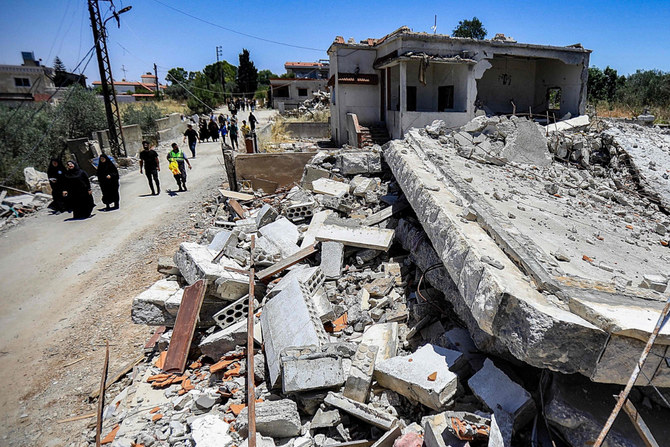BEIRUT: Lebanon’s Foreign Affairs Minister Abdallah Bou Habib met with French Ambassador Herva Magro, the UN Special Coordinator for Lebanon Jeanine Hennis-Plasschaert, and US Ambassador Lisa Johnson on Friday.
The minister reiterated Lebanon’s call for the full implementation of UN Resolution 1701.
Hennis-Plasschaert said there was “no inevitability (to wider conflict with Israel)” during her visit to UN peacekeepers in southern Lebanon.
Also on Friday, it was announced that German Foreign Minister Annalena Baerbock will make shuttle visits to Lebanon, Israel, and the West Bank.
Concerned at the risk of Israel’s war on Gaza spreading across the region, US President Joe Biden sent his special envoy Amos Hochstein to embark on a new round of diplomacy last week. Hochstein called for “urgent” de-escalation during talks with Lebanon and Israel on Tuesday, informing both sides that “the threat of a full-scale war persists and must be avoided.”
It is widely believed in Lebanon that Hochstein convinced Israel to refrain from escalating its military actions against Lebanon for the time being.
In a meeting with visiting Israeli officials including National Security Advisor Tzachi Hanegbi and Strategic Affairs Minister Ron Dermer in Washington on Thursday, US Secretary of State Antony Blinken underscored the importance of “avoiding further escalation in Lebanon and reaching a diplomatic resolution that allows Israeli and Lebanese families to return to their homes,” according to a statement.
According to his spokesperson, Matthew Miller, Blinken also stressed America’s “unwavering commitment to Israel’s security.”
During his talks in Beirut, Hochstein reportedly reassured Lebanese Prime Minister Najib Mikati that Biden’s proposal for a ceasefire in Gaza was being viewed positively, and that Qatar was working to make it happen.
Hochstein also reportedly told Mikati that “things are under control and positive when it comes to the war between Lebanon and Israel.”
Former Lebanese Ambassador to Washington, Riad Tabbarah, described threats of war as a “mere outburst.”
He told Arab News: “Since military operations began on the southern front about nine months ago, the Lebanese have been hearing that war is coming, but it never arrives.
“During diplomatic negotiations, it is common for both sides to face pressure and threats,” he continued. “It appears that there are numerous and diverse negotiations happening behind the scenes, including discussions between the Americans and Iranians, as well as between the Americans and Hezbollah.”
Tabbarah acknowledged the recklessness of Israeli Prime Minister Benjamin Netanyahu and said the Israeli leader “has two options — either war or prison. And there is significant pressure on him, especially from the families of the hostages.”
Tabbarah noted that there are limits to what military action can achieve. “We still recall the time when former Israeli Prime Minister Ariel Sharon crossed those limits in 1982 when he set the Litani Line as his target. However, he went beyond that and reached Beirut. As a result, international powers united to bring him back to the Litani Line.
“No one has an interest in war,” he continued. “Americans, Europeans, and Iranians are working in the opposite direction. The general trend is to avoid escalating to open war.”
Military operations on the Lebanese front decreased significantly on Friday, although the outskirts of Naqoura in the western sector were targeted by Israeli artillery, causing a fire in a house. In the morning, an Israeli military raid targeted the town of Wazzani.
Hezbollah made a series of announcements about their operations, which were “focused on specific targets within the rules of engagement.”
Hezbollah attacked the sites of Ramtha and Samaka in the occupied Lebanese Kfar Shouba Hills, the Zabadin site in the occupied Lebanese Shebaa Farms, and carried out an air attack using drones on the Ras Al-Naqoura naval site, aiming at locations containing Israeli military personnel.
The Lebanese Ministry of Health said that, up to June 19, it has recorded a total of 1,774 casualties, including 432 fatalities, caused by Israeli attacks.


























